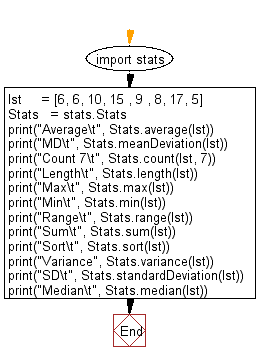Python Projects: Perform some simple statistics on a list of values
Python Project-11 with Solution
Create a Python project to perform some simple statistics on a list of values.
Sample Solution:
Python Code:
main.py
#Source: https://bit.ly/3eJPW8E
import stats
lst = [6, 6, 10, 15 , 9 , 8, 17, 5]
Stats = stats.Stats
print("Average\t", Stats.average(lst))
print("MD\t", Stats.meanDeviation(lst))
print("Count 7\t", Stats.count(lst, 7))
print("Length\t", Stats.length(lst))
print("Max\t", Stats.max(lst))
print("Min\t", Stats.min(lst))
print("Range\t", Stats.range(lst))
print("Sum\t", Stats.sum(lst))
print("Sort\t", Stats.sort(lst))
print("Variance", Stats.variance(lst))
print("SD\t", Stats.standardDeviation(lst))
print("Median\t", Stats.median(lst))
Flowchart:

stats.py
class Stats():
"""
Stats class for performing some simple statistics on a list of values.
"""
def __init__(self):
"""
Constructor method.
"""
pass
@staticmethod
def average(lst):
"""
Computes the average.
"""
return __class__.sum(lst) / __class__.length(lst)
@staticmethod
def meanDeviation(lst):
"""
Computes the mean deviation.
Mean Deviation is average of distance of each value from that mean(average).
"""
average = __class__.average(lst)
mean_deviation = 0
for v in lst:
mean_deviation += abs(average - v)
return mean_deviation / __class__.length(lst)
@staticmethod
def count(lst, value):
"""
Counts the occurrence of a value in a list of values.
"""
return lst.count(value)
@staticmethod
def variance(lst):
"""
Computes the variance.
Variance is useful to see how the list of values varied against the average.
"""
average = __class__.average(lst)
variance = 0
for v in lst:
variance += ((average - v) ** 2)
return variance / __class__.length(lst)
@staticmethod
def standardDeviation(lst):
"""
Computes the standard deviation.
Standard Deviation is useful to give an idea about range of normal values(i.e. location of most of values).
"""
return __class__.variance(lst) ** 0.5
@staticmethod
def median(lst):
"""
Computes the median.
Median is the middle value in a sorted list of values.
"""
lst = __class__.sort(lst)
length = __class__.length(lst)
mid = int(length / 2)
if length % 2 == 0:
return (lst[mid] + lst[mid - 1]) / 2
return lst[mid]
@staticmethod
def max(lst):
"""
Returns the max value.
"""
return max(lst)
@staticmethod
def min(lst):
"""
Returns the min value.
"""
return min(lst)
@staticmethod
def range(lst):
"""
Returns the difference between max and min values.
"""
return __class__.max(lst) - __class__.min(lst)
@staticmethod
def sum(lst):
"""
Returns summation of all values in a list.
"""
return sum(lst)
@staticmethod
def length(lst):
"""
Returns the length of list.
"""
return len(lst)
@staticmethod
def sort(lst):
"""
Sorts the list.
"""
return sorted(lst)
Output:
Average 9.5 MD 3.375 Count 7 0 Length 8 Max 17 Min 5 Range 12 Sum 76 Sort [5, 6, 6, 8, 9, 10, 15, 17] Variance 16.75 SD 4.092676385936225 Median 8.5
Flowchart:

Go to:
Contribute your code and comments through Disqus.
